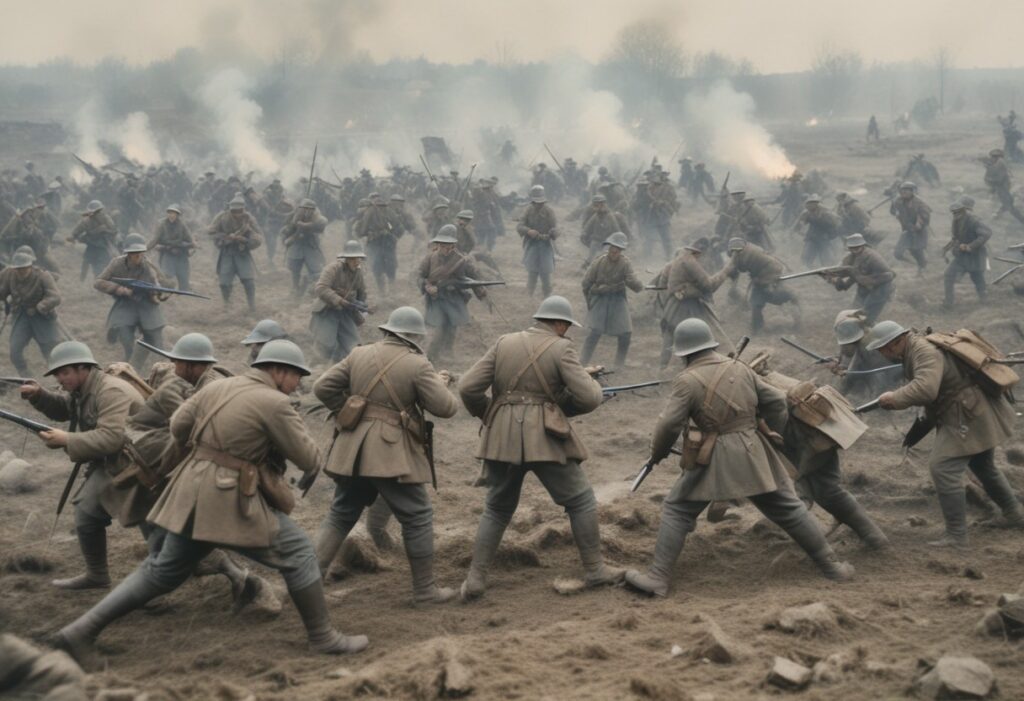The Battle of Verdun was a really awful part of World War I, showing just how terrible the fighting was during that time. It went on for a long time, from February 21 to December 18, 1916, and it was one of the worst battles ever. The French and German armies fought near the town of Verdun-sur-Meuse in northeastern France. Lots of people got hurt or killed, and it’s something that people still remember today. This article looks at why the battle happened, what happened during it, and what effects it had on everyone involved.
How and why the battle began
As the year 1916 began, the Western Front in World War I was a place of constant fighting and hardship. Both sides, the Allies and the Central Powers, were stuck in a situation where neither could gain an advantage. The German leader, General Erich von Falkenhayn, wanted to change this. He came up with a plan to attack the French army relentlessly at Verdun, a town in northeastern France that was important for both sides.
Verdun was chosen because it was a key part of France’s defenses and capturing it would be a big blow to French morale. The Germans hoped that taking Verdun would help them win the war. But for the French, holding onto Verdun was crucial. Losing it would put them in a vulnerable position and could lead to defeat.
So, on February 21, 1916, the Germans launched a massive attack on Verdun. They used heavy artillery and other weapons to bombard the French defenses. The fighting was intense and went on for weeks. Despite facing heavy losses, the French soldiers, led by General Philippe Pétain, refused to give up. They were determined to defend Verdun at all costs, even though the conditions were terrible and the fighting was brutal.
The Battle of Verdun was one of the deadliest battles of World War I. The landscape was destroyed, and many lives were lost on both sides. It showed the world the terrible impact of war. As we remember the Battle of Verdun, we honor the soldiers who fought and died there, and we hope that such a tragedy never happens again.
Verdun’s importance in strategy
Verdun, a small town by the Meuse River, was crucial in World War I. Both the French and German armies saw its value. It was in northeastern France and was vital for France’s defense. The town guarded important railways and roads that helped the French move troops and supplies.
If Verdun fell to the Germans, it would have been bad for France. It could have led to the Germans getting closer to Paris, France’s capital. Losing Verdun would have hurt French morale and pride. It would have been a big blow to the French Republic and could have made the Allies weaker.
But for the French, keeping Verdun was very important. It wasn’t just about strategy. It was about honor and showing defiance against the Germans. Verdun was a symbol of France’s spirit to fight back. French soldiers fought hard, even though the odds were against them.
The defense of Verdun showed how brave and determined the French were. General Philippe Pétain’s words, “Ils ne passeront pas” (“They shall not pass”), showed this determination. Verdun became a place of bravery and sacrifice.
In history, Verdun is remembered for its courage and strength in tough times. It wasn’t just a battle; it showed the world how people can stay strong and united in tough times.
The German attack
On February 21, 1916, the peace of Verdun was shattered by the loud sounds of artillery as the German army attacked the French defenses. This marked the start of a very tough time in military history—the German attack on Verdun.
The German attack started with a lot of artillery fire. It was a loud noise that could be heard everywhere, showing that a big fight was coming. The Germans used a new tactic called “stormtroopers” along with heavy artillery. Their plan was to destroy the French defenses and make it easier for their soldiers to attack.
The bombing was very intense. The shells destroyed everything in their path. They broke through the trenches and destroyed the defenses. The air was thick with smoke and the smell of explosives. The ground shook because of the constant bombing.
But even with all this destruction, the French soldiers, led by General Philippe Pétain, didn’t give up. They stood strong against the bombs and gunfire, ready to defend Verdun no matter what. Pétain knew how important Verdun was and promised to stop the Germans, even if it seemed impossible.
As the bombing went on, the French soldiers prepared for the German attack. The German soldiers, wearing helmets and grey uniforms, came out from the smoke, moving closer to the French positions. The stormtroopers, their best soldiers, led the way, ready to fight the French soldiers face to face.
But the French soldiers didn’t back down. They fought bravely, stopping the German attacks and causing them a lot of harm. They didn’t let the Germans take over.
General Pétain’s leadership was very important. He made good plans and stayed calm, which helped his soldiers feel confident. His famous words, “Ils ne passeront pas” (“They shall not pass”), became a sign of hope for the French soldiers, showing they were ready to fight.
As time passed, the fighting at Verdun became very tough. Neither side wanted to give up any ground. The land around Verdun turned into a horrible place, covered in mud, blood, and broken things. But even in such a tough situation, the French soldiers kept fighting hard, showing their bravery and strength.
The German attack on Verdun was a very bad time, showing how bad war can be. But it also showed how strong people can be when they have to. As we remember what happened at Verdun, let’s not forget the sacrifices made by those who fought there, and let’s work to make sure such terrible things never happen again.
The French Defense
General Philippe Pétain’s famous words, “Ils ne passeront pas” (“They shall not pass”), showed the strong will of the French soldiers at Verdun. When the German attack came, Pétain knew how serious it was and made a plan to stop them, no matter what.
Pétain’s plan was to defend Verdun with everything they had. He spread the French soldiers out around the town in different groups, ready to help each other if they needed it. This way, even if the Germans broke through in one place, the French could stop them in another.
Pétain also knew that the soldiers needed breaks to stay strong. So, he made sure they had time to rest and get new soldiers to help them. This helped keep the soldiers fighting for the whole ten months of the battle.
To make sure the soldiers had what they needed, Pétain organized a good system to bring them more soldiers, weapons, and other things they needed. Even though it was hard to move things through the rough land and bad weather, Pétain’s plan worked well.
The land around Verdun was also a big help in keeping the Germans out. The hills, forests, and steep areas made it hard for the Germans to move forward. And the forts and trenches built by the French army made it even harder for the Germans to get into Verdun.
During the battle, the French soldiers fought very hard, even when things looked bad. They believed in Pétain’s words and were ready to do anything to keep Verdun safe. Even with a lot of soldiers hurt and the Germans bombing them all the time, the French soldiers didn’t give up.
At Verdun, the French defense showed how strong people can be when they have to fight for their country. Pétain’s leadership and good plans made a big difference in the battle. After the battle, Pétain became a hero in France. The defense of Verdun showed the world how brave and determined the French people were, even in the hardest times.
The long and tiring battle
The Battle of Verdun turned into a long and brutal fight, marked by constant artillery attacks, fierce close combat, and a lot of soldiers getting hurt or killed. The French soldiers, driven by pride in their country and a strong determination to protect it, refused to give up even when things looked bad. Even with the Germans attacking them fiercely, the French soldiers bravely held onto their positions and didn’t let the enemy take any ground.
The Germans faced many tough problems during the battle. They had a hard time getting enough supplies to keep fighting, and they lost a lot of soldiers. They hoped to win quickly, but instead, they found themselves stuck in a long and hard battle where they had to fight for every inch of ground.
Verdun became a place of great suffering and bravery, where soldiers from both sides showed incredible courage and strength, even in the face of terrible conditions. As the battle went on, it became clear that Verdun was going to cost a lot of lives and bring a lot of pain to everyone involved.
Tactics and Innovations
The Battle of Verdun was a crucial moment in how wars are fought today, with French and German forces using new tactics and weapons to gain an edge. Poison gas, which had devastating effects before, was used again to try to break the stalemate. Flamethrowers were also introduced, causing chaos and destruction.
Aerial reconnaissance became important for gathering information and targeting enemy positions. Pilots risked their lives in dogfights above Verdun.
Outside of combat, the battle showed how entire societies got involved in war. Civilians helped by making weapons and caring for the injured, showing how war affected everyone.
Verdun was where new tactics and weapons were tested, shaping modern warfare. It revealed the horrors of war and how far nations would go to win. As the battle continued, it became clear that old ways of fighting no longer worked, and both sides had to adapt to survive.
Casualties
The Battle of Verdun caused immense suffering, with around 700,000 men killed, wounded, or missing during the ten-month-long battle. The once lively fields and hills around Verdun turned into a bleak landscape of mud, craters, and barbed wire, scattered with the remains of soldiers and equipment.
The human suffering was beyond measure. Lives were lost, families torn apart, and communities destroyed by the relentless violence. Survivors carried physical and emotional scars that lasted long after the fighting stopped, reminders of the horrors they endured.
Civilian populations in the area suffered greatly too. Caught in the fighting, they faced bombings, displacement, and hardship as their homes and livelihoods were destroyed. Some became refugees, fleeing for safety, while others struggled to survive amidst the ruins.
The Battle of Verdun serves as a grim reminder of the true cost of war, showing the pointless and cruel nature of armed conflict. As we remember this dark time in history, let’s honor the sacrifices of those who fought and died at Verdun, and work to ensure that such tragedies never happen again.
Leadership and Legacy
The Battle of Verdun highlighted how leadership can shape the outcome of large military battles, leaving a significant mark on military strategy and tactics. General Philippe Pétain, who orchestrated the French defense at Verdun, emerged as a key figure whose effective management of resources and morale greatly influenced the battle’s result. Pétain’s strategic skills and unwavering determination earned him praise during and after the battle, leading to his promotion to the prestigious rank of Marshal of France. His leadership during Verdun’s darkest moments embodied qualities like resilience, determination, and adaptability crucial for success in wartime.
Conversely, the German High Command’s inability to achieve a decisive breakthrough at Verdun exposed leadership and strategic deficiencies with long-lasting repercussions. Despite hoping for a quick win, German commanders found themselves stuck in a prolonged and bloody struggle, unable to overcome French defenders’ fierce resistance. The failure to meet objectives at Verdun fueled internal conflicts within the German military hierarchy, weakening confidence in leadership and undermining the German war effort in subsequent years.
In military history, the leadership displayed at Verdun serves as a poignant reminder of commanders’ pivotal role in shaping battle outcomes. From Pétain’s effective leadership to the German High Command’s struggles, the lessons learned from Verdun continue to influence military doctrine and strategy today, emphasizing the enduring importance of leadership during crises.
The Battle of Verdun stands as a grim reminder of humanity’s ability to endure and sacrifice amid extreme adversity. For ten grueling months, amid artillery blasts and smoke, soldiers from both sides fought fiercely for control of a small patch of French land. Verdun’s toll was immense, with hundreds of thousands dead and countless lives forever altered by war’s horrors.
Yet, amid the devastation, the battle also showcased humanity’s resilience. From frontline trenches to support areas, soldiers and civilians alike showed bravery, compassion, and resilience against overwhelming odds. Their sacrifices and courage offer hope in a world too often marred by conflict.
As we recall Verdun’s events, let’s not forget its lessons. Let’s remember the tragedy and devastation of war and strive for a future where such conflicts are distant memories. Let’s work towards a world of peace and prosperity, honoring the sacrifices of those who fought and died in war’s wake.










More Stories
Alexander the Great: A Legacy Unparalleled
The Mauryan Era: India’s first great empire
The Great Depression: Overview, Causes and Effects